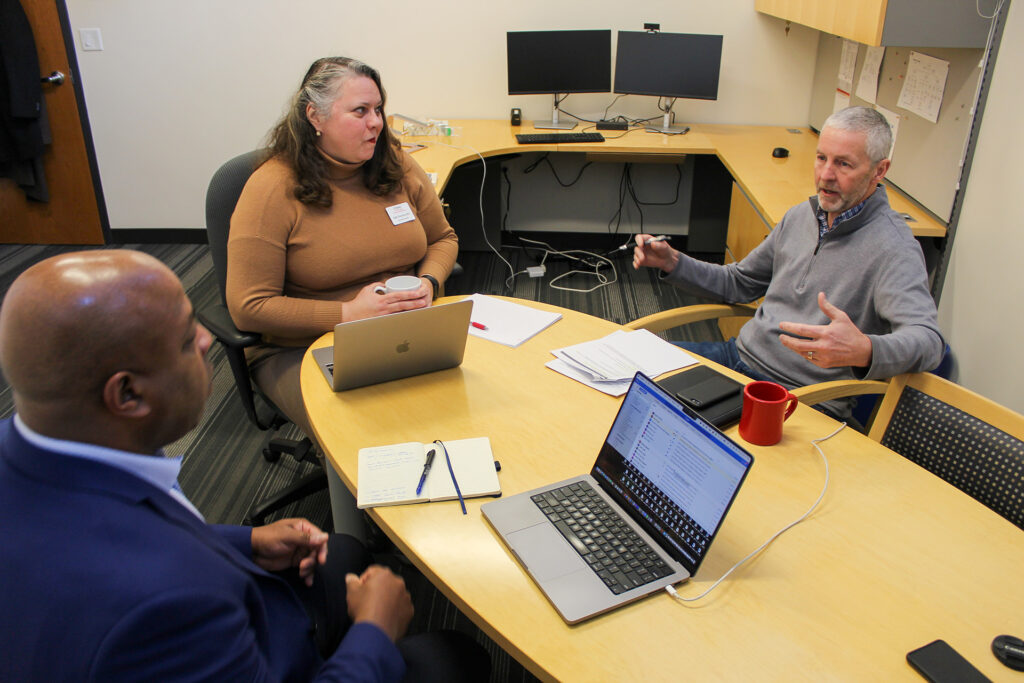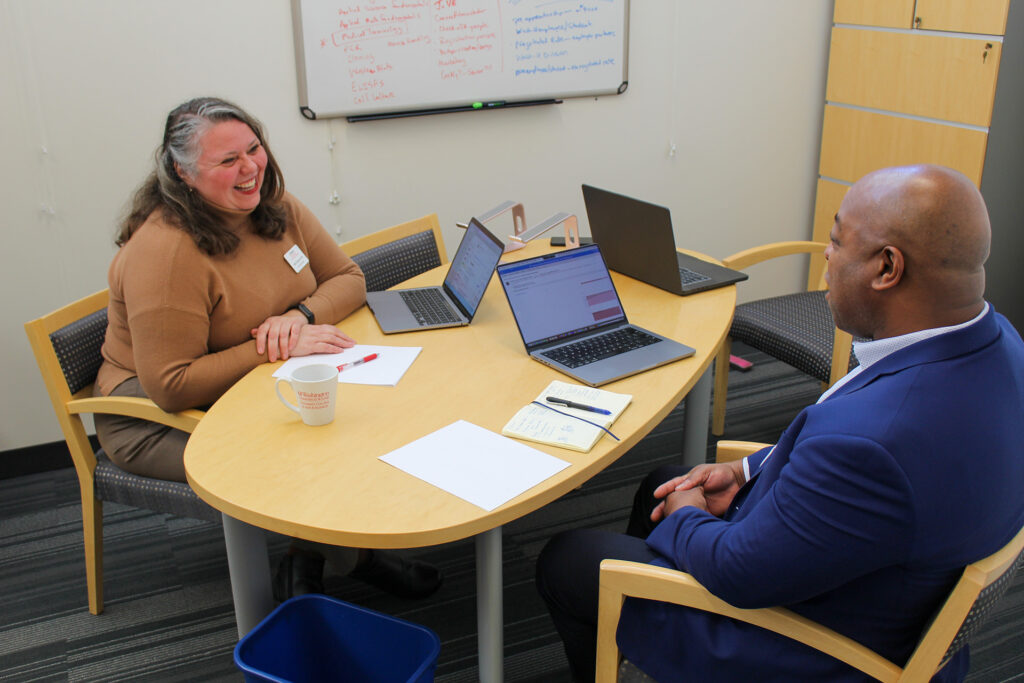How the CAPS Instructional Design Team Sets the Stage for Faculty Success
When students log in to their courses at WashU Continuing & Professional Studies (CAPS), the experience feels seamless. But behind every module and interactive discussion board is a team working tirelessly to ensure that every CAPS student gets the highest quality learning experience possible. The Instructional Design team, often invisible to students, plays a crucial role in shaping the learning environment. They are the quiet architects of digital education—troubleshooting tech, consulting with instructors, and making sure every course meets high standards before it even begins.
At the start of this semester, Dean Sean Armstrong got a peek at the work the Instructional Design Team does during his quarterly Dean’s Day at Your Desk. This initiative provides Armstrong with a behind-the-scenes look at how staff support modern learners at CAPS and highlights the planning, problem-solving and passion that power student success. This quarter, Instructional Specialist Kella Thornton shared her daily work with Armstrong, walking him through the course checks, faculty consultations and collaborative planning that ensure well-designed courses.
Thornton kicks off her day by diving into the “course checks” the ID team performs on all courses each semester. This quality assurance process ensures that online and hybrid courses meet strict standards before students log in. Verifying that courses are properly published in Canvas is crucial to ensuring the necessary tools are integrated so instructors are aware of any needed changes before class starts.
“It ensures that everyone is at the same place — focused on thoughtful, evidence-based practices about teaching in an online environment,” said Thornton. “But even more than that, it ensures that the students have a very uniform experience.”
Of course, instructional support at CAPS isn’t one-size-fits-all. In addition to the regular course checks, Thornton and other members of the Instructional Design team meet one-on-one with faculty to discuss teaching strategies and new educational technologies.
The entire Instructional Design team works remotely, giving them valuable insight into how students and faculty might be interacting with content in an online environment.
“Because we work online, we have to use new technology in robust and inventive ways,” said Thornton. “We are often the first ones trying and pioneering certain learning technologies that faculty might use in their classrooms and that students will use as well. A lot of the things that we are coaching faculty through are things we have had first-hand experience with.”
The team also hosts an annual instructor “Show and Share” where they highlight digital teaching strategies that have been especially effective in the previous year.
“We try to meet faculty where they are,” Thornton explains, helping instructors build confidence and competence in a rapidly evolving digital learning environment.
During the Dean’s Day, Armstrong learns that that level of support is not just reserved for instructors, sitting in on a weekly one-on-one between Thornton and her supervisor. These weekly check-ins are designed to be safe spaces for members of the team to share any concerns or issues they may be having in their work and get rapid support from the department leader.
“The importance of regular feedback and check-ins is not just for remote employees, it’s for anyone working on a collaborative team,” Thornton said, highlighting how check-ins help align priorities, ensure the team stays on track when working on multiple projects and build camaraderie within the team. “When we can put our heads together we are much more effective and have more creative, interesting and innovative ideas.”
In the afternoon, Thornton shifts gears into a formal course review meeting with CAPS instructor Mark Franke. These formal reviews are much more in-depth than the start-of-semester course checks, with members of the Instructional Design team evaluating every aspect of a course including course structure, accessibility and engagement strategies.
“One of the joys of my job is facilitating online instructor training and course reviews,” said Thornton. “I got to watch Mark build his course bit by bit and then launch it for the first time. It is a labor of love for an instructor. In Mark’s case, he was coming to us from industry and was really well versed and very experienced in the corporate world. Watching him take things he had learned in his own experience and apply them in an online classroom setting was incredibly rewarding to see.”

Using the CAPS Online & Hybrid Teaching Rubric, instructors and the ID team work together to set clear expectations of course quality and discover ways to continuously improve the student experience through instructional innovation.
“It is a wrap-around support where we are with the faculty member from the moment they first enter CAPS,” Thornton added.
Franke agreed, highlighting how helpful the support had been in creating a successful first class.
“To have those resources available and willing to help is amazing, it allowed me more time to focus on the content and delivery of the class,” he said. “For a first-time online instructor, it was an invaluable resource.”
Thornton’s motivation is simple: making life easier for faculty and learning better for students. She sees her role as both a guide and a collaborator—someone who empowers instructors to succeed in the classroom and ensures students encounter thoughtful, well-designed courses. She also ensures that CAPS courses meet federal guidelines like RSI (Regular and Substantive Interaction), while staying current with evolving best practices in online education and accessibility.
As Dean’s Day at Your Desk made clear, student success at CAPS is a school-wide effort—and Thornton’s day is just one example of the dedication that go into every course. At CAPS, that kind of support isn’t optional—it’s foundational.
